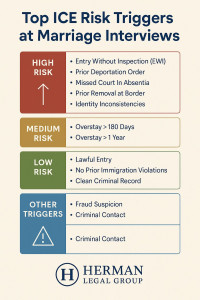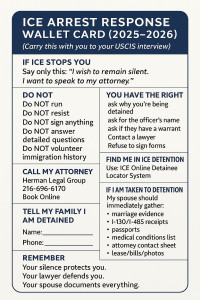FEATURED HLG ARTICLES:
Yes — ICE has arrested marriage-based green card applicants during interviews at the USCIS San Diego Field Office, including spouses of U.S. citizens with otherwise clean marriage cases.
These San Diego arrests are confirmed and have been reported by:
While confirmed cases exist only in San Diego, experts emphasize:
If ICE can do this at USCIS San Diego, USCIS can do it anywhere.
There is no legal barrier preventing the same practice in any USCIS field office nationwide.
The enforcement mechanism is federal and uniform, not specific to one city.

Not yet confirmed elsewhere:
Why this matters:
Key HLG Guides (Link repeatedly throughout the article):

For years, Adjustment of Status interviews were seen as routine, even reassuring — especially for couples with bona fide marriages.
But the confirmed arrests in San Diego reveal a disturbing shift:
This article explains:
According to multiple media reports:
Reference:

Yes. There is nothing legally unique about San Diego.
Any USCIS field office can become an enforcement point at any time.
Reality: Marriage offers eligibility; it does not cancel deportation grounds.
Reality: At least one San Diego case involved a spouse with no criminal history.
Reality: Under 2025 directives, USCIS must refer certain files to ICE.
Reality: California was simply the first to be documented.
Legally, this can happen anywhere.
San Diego is often a federal pilot site used to test new enforcement strategies.
Historically:
All appeared first near the Southern border before spreading nationally.
The pattern suggests:
San Diego is not an anomaly. It is a prototype.
Even in San Diego’s confirmed cases, several individuals fit one or more risk categories.
Even some “low risk” cases in San Diego still resulted in ICE involvement.

From a qualified immigration attorney
(you may link: Book Consultation)
“I choose to remain silent. I want to speak to my attorney.”

A qualified attorney will:
San Diego families reported:
What happened in San Diego could play out:
“San Diego proves the model. If DHS authorizes ICE to detain a marriage-based applicant in one field office, the practice can be deployed nationwide.”
— Richard Herman, Esq.
HLG is already advising applicants nationwide to prepare for the possibility of enforcement at interviews, even in field offices with no confirmed cases.

Yes — in San Diego only so far.
There is no legal barrier preventing nationwide expansion.
No.
Yes.
No, not for administrative immigration arrests.
Yes — and under 2025 rules, certain referrals are mandatory.
No.
No.
Very high risk.
High risk.
Risk depends on length + history.
Depends on entry history + prior orders.
Legally, yes.
Yes.
ICE can still detain you.
This has no impact on enforcement referrals.
Yes, particularly if any risk factors exist.
Yes.
Yes.
Immigration violations still override.
FOIA all agencies.
Yes.
Only after legal risk analysis.
Likely a removal order.
FOIA needed — you may have expedited removal.
If you have a prior order.
Possibly.
Often terminated or denied.
Depends on the order type.
Yes.
Typically no.
No — San Diego cases involved military families.
Not always.
Sometimes can delay or mitigate.
Consult an attorney.
Unseen issues may exist.
Possibly — DHS has authority.
Dangerous — consult an attorney.
Not automatically.
Not always.
Yes — it shows preparation.
No immunity.
Rarely.
Yes.
Possibly — spouses should know their rights.
Usually yes, but not guaranteed.
You may request counsel.
Bring everything — but this does NOT reduce risk.
Not for enforcement purposes.
If there are any risk factors — yes.
Por: Richard T. Herman, Esq.
La administración del presidente Biden ha anunciado una nueva política de inmigración para proteger a los cónyuges y niños indocumentados de ciudadanos estadounidenses, abordando el sistema de inmigración roto y proporcionando visas de trabajo para los titulares de DACA con títulos universitarios. Esta guía le llevará a través de lo que sabemos ahora del proceso de solicitud, elegibilidad, documentos requeridos y problemas comunes que pueden surgir, con ejemplos de la vida real y puntos de datos para ayudarle a entender.
El 18 de junio de 2024, el presidente Joe Biden anunció un nuevo programa de inmigración, “Mantener a las Familias Unidas”, que permitirá a algunos cónyuges de ciudadanos estadounidenses solicitar “parole-in-place” con el Departamento de Seguridad Nacional (DHS). Este programa aún no está abierto para solicitudes y beneficiará hasta a 550,000 personas con protecciones temporales y permisos de trabajo en los EE.UU., y la capacidad de solicitar el estatus de residente permanente legal (LPR) (tarjeta verde) a través de su cónyuge sin ser separados de sus familias durante años.

DHS: Protegiendo a las familias y
manteniéndolas juntas
El secretario del DHS, Alejandro N. Mayorkas, emitió esta declaración:
“Hoy, el Departamento de Seguridad Nacional está tomando medidas para mantener a las familias estadounidenses unidas y acabar con el miedo y la incertidumbre que estas familias enfrentan cuando un cónyuge es ciudadano estadounidense y el otro es indocumentado. Muchas de estas familias tienen hijos ciudadanos estadounidenses. Los cónyuges indocumentados que se beneficiarán de nuestra acción han vivido y contribuido a este país durante un promedio de 23 años.”
El Problema
Cónyuges de Ciudadanos Estadounidenses
Los ciudadanos estadounidenses pueden solicitar que su cónyuge no ciudadano obtenga la residencia permanente. Pero el proceso está lleno de obstáculos, especialmente para aquellos que ingresaron a los EE.UU. sin inspección, lo que dificulta obtener la residencia permanente legal. Muchas de estas personas no han podido obtener el estatus legal al que son elegibles debido a la burocracia y al riesgo de ser separados de sus familias si dejan los EE.UU. para asistir a entrevistas consulares.
Ejemplo de la Vida Real: María y John
María ingresó a los EE.UU. sin inspección hace más de 15 años y se casó con John, un ciudadano estadounidense, hace 8 años. A pesar de ser elegible para una tarjeta verde a través de su matrimonio, María no podía solicitarla sin estar sujeta a una prohibición de reingreso de 10 años debido a su presencia ilegal. Este nuevo programa es un salvavidas, permitiéndole ajustar su estatus (obtener una tarjeta verde) sin salir del país y proporcionando protecciones contra la deportación.
La Solución: Parole-In-Place
El parole-in-place permite a los beneficiarios solicitar el ajuste de estatus en los EE.UU., sin salir del país y sin activar prohibiciones de reingreso. Incluso si el programa se detiene o se revierte en el futuro, aquellos que obtengan el parole tendrán un camino mucho más fácil para convertirse en residentes permanentes.
Visas de Trabajo para Titulares de DACA
Los titulares de DACA con títulos universitarios, bajo el programa de Acción Diferida para los Llegados en la Infancia, ahora pueden obtener visas de trabajo para empleos altamente calificados. Esto ayudará a los Dreamers a contribuir más a la economía y la sociedad.
El Secretario del DHS, Alejandro N. Mayorkas:
“Además, trabajaremos con nuestros colegas del Departamento de Estado para implementar cambios en el proceso de exención de inadmisibilidad para que ciertos no ciudadanos que fueron educados en los EE.UU., incluidos los beneficiarios de DACA, puedan obtener visas de trabajo para empleos altamente calificados para los cuales están calificados.”

Cómo Prepararse para Solicitar el Nuevo Programa de Inmigración de Biden
Requisitos
El Servicio de Ciudadanía e Inmigración de los Estados Unidos ha emitido estas instrucciones: Proceso para Promover la Unidad y Estabilidad de las Familias.
Para cónyuges e hijos indocumentados
Para ser elegible para el permiso de permanencia temporal (parole) bajo este nuevo proceso, debe:
Para Titulares de DACA que Buscan Residencia Permanente Legal
Preparándose para Presentar su Solicitud
Antes de que comience el proceso de solicitud, puede hacer lo siguiente:
Recolección de Documentos
Reunir documentos es clave. Aquí hay una lista de documentos para recopilar:
Prueba de Presencia Continua
Prueba de Matrimonio
Registros Criminales y de Seguridad
Otros Factores Discrecionales Favorables
Crear o Actualizar su Cuenta myUSCIS
Tener una cuenta en myUSCIS facilitará el proceso. Puede crear o actualizar su cuenta en myUSCIS.
Proceso de Solicitud
Paso a Paso
Biometría y Verificación
Se requerirá una verificación biométrica, que incluye la toma de huellas dactilares y verificaciones de antecedentes. Esto es para verificar la identidad y la seguridad.
Autorización de Empleo
Una vez que se haya otorgado el parole, puede solicitar un Documento de Autorización de Empleo (EAD) utilizando el Formulario I-765 con el código de categoría (c)(11). Esto le permitirá trabajar en los EE.UU. mientras su ajuste de estatus está pendiente.
Evite Estafas
Cuídese de las estafas de inmigración. Aquí está cómo protegerse:
Historias y Ejemplos de la Vida Real
Ejemplo: David y Elena
David, un ciudadano estadounidense, se casó con Elena, quien ingresó a los EE.UU. sin inspección hace más de 20 años. Tienen tres hijos ciudadanos estadounidenses. A pesar de ser elegible para una tarjeta verde, Elena corría el riesgo de ser separada de su familia si dejaba los EE.UU. para solicitarla. El nuevo programa de parole-in-place le da la oportunidad de ajustar su estatus (obtener una tarjeta verde) mientras permanece con su familia, brindándoles estabilidad y tranquilidad. Los defensores de la inmigración han elogiado el nuevo programa por proporcionar un alivio muy necesario a familias como la de David y Elena.
Ejemplo: Eduardo, un Beneficiario de DACA
Eduardo, un beneficiario de DACA con un título en ingeniería, ha estado en los EE.UU. desde que era niño. La nueva política le permite solicitar una visa de trabajo para empleos altamente calificados y trabajar legalmente en su campo, contribuyendo a la economía. Esto le proporcionará la oportunidad de solicitar una tarjeta verde a través del empleo. La historia de Eduardo es la de un Dreamer que ha sido educado en los EE.UU. y está listo para retribuir.
Preguntas Frecuentes
¿Cuándo comienza?
USCIS publicará un Aviso del Registro Federal pronto que proporcionará detalles sobre el proceso de solicitud y los requisitos. Comenzará más adelante este verano.
¿Qué pasa si presento la solicitud ante USCIS antes de la fecha de inicio?
USCIS rechazará cualquier presentación recibida antes de la fecha de inicio. Espere el anuncio antes de enviar.
¿Cuánto dura el parole?
El parole será por hasta 3 años. Durante este período, los cónyuges elegibles pueden solicitar el ajuste de estatus.
¿Qué documentos debo reunir de antemano?
Recopile documentos que demuestren presencia continua en los EE.UU., prueba de matrimonio válido y cualquier otro factor favorable.
¿Necesitaré presentar datos biométricos?
Sí, los solicitantes deberán presentar información biográfica y biométrica.
¿Puedo solicitar el EAD con mi solicitud de parole?
Puede solicitar el EAD después de recibir el parole presentando el Formulario I-765.
¿Hay tarifas involucradas?
Las tarifas se anunciarán en el Aviso del Registro Federal. Es posible que haya exenciones de tarifas disponibles.
¿Qué pasa si tengo antecedentes penales?
Los solicitantes con condenas criminales descalificadoras o que representen una amenaza para la seguridad nacional o la seguridad pública no serán elegibles.
¿Pueden los hijos de cónyuges elegibles también recibir el parole?
Sí, los hijos no ciudadanos que estén físicamente presentes en los EE.UU. y tengan una relación de hijastro/a calificada con un ciudadano estadounidense antes del 17 de junio de 2024, también pueden recibir el parole.
¿Qué pasa si el programa se termina?
Incluso si el programa se termina, aquellos que hayan recibido el parole aún serán considerados paroled en los EE.UU. y pueden solicitar el ajuste de estatus sin salir del país.
Problemas Comunes y No Tan Comunes
Problema: Documentos Incompletos
Asegúrese de que todos los documentos requeridos estén completos y sean precisos. Las solicitudes incompletas serán retrasadas o denegadas.
Problema: Tiempo
No presente antes de la fecha de inicio. Esté atento a los anuncios de USCIS para conocer la fecha exacta.
Problema: Representación Legal
Solo use representantes legales autorizados para recibir asesoramiento y ayuda con la solicitud. Los practicantes no autorizados harán más daño que bien.
Problema: Datos Biométricos
Las citas de biometría perdidas retrasarán su solicitud. Asista a todas las citas programadas.
Problema Menos Común: Doble Nacionalidad
Si tiene doble nacionalidad, asegúrese de que todos los documentos sean consistentes y demuestren residencia y elegibilidad en los EE.UU.
Problema Menos Común: Órdenes de Deportación Previas
Si tiene una orden de deportación previa, consulte con un abogado para ver cómo esto afectará su elegibilidad y el proceso de solicitud.
Otras Consideraciones para los Solicitantes
Historial Laboral
Tener un historial laboral estable puede ser un factor favorable en el proceso de revisión discrecional. Reúna documentos como talones de pago, contratos de empleo y cartas de empleadores.
Participación Comunitaria
Participar en actividades comunitarias y trabajo voluntario puede fortalecer su solicitud. Recoja cartas de recomendación y pruebas de participación de organizaciones comunitarias.
Educación
Si ha asistido a educación superior en los EE.UU., incluya transcripciones, diplomas y cualquier premio o reconocimiento recibido. Esto demuestra su compromiso con el desarrollo personal y con la sociedad.
Datos y Estadísticas del Mundo Real
Familias con Estatus Mixto
Según un informe del Instituto de Políticas de Migración, hay aproximadamente 1.2 millones de familias de estatus mixto en los EE.UU. donde al menos un miembro es indocumentado y otros son ciudadanos o residentes legales. Esta política podría ayudar a muchas de estas familias al reducir el riesgo de separación y proporcionar un futuro más seguro. Según FWD.us, una organización de defensa de la inmigración, esta política podría ayudar a muchas de estas familias al reducir el riesgo de separación y proporcionar un futuro más seguro.
Beneficios Económicos
La investigación muestra que legalizar a los inmigrantes indocumentados tiene beneficios económicos. Un informe del Center for American Progress dice que legalizar a los inmigrantes indocumentados podría aumentar sus salarios en un 15%, lo que resultaría en más ingresos fiscales y crecimiento económico. Los altos funcionarios de la administración han enfatizado los beneficios económicos de legalizar a los inmigrantes indocumentados, señalando el potencial para aumentar los ingresos fiscales y el crecimiento económico.
Beneficios a Largo Plazo
El American Immigration Council señala que los inmigrantes que obtienen estatus legal invertirán en educación, comprarán casas y comenzarán negocios, y contribuirán a la estabilidad y prosperidad a largo plazo de sus comunidades.
Los esfuerzos de la administración Biden para asegurar la frontera sur y abordar el sistema de inmigración roto son parte de una estrategia más amplia para proporcionar estabilidad y prosperidad a largo plazo para las comunidades.
Resumen del Sistema de Inmigración Roto
La nueva política de inmigración del presidente Biden da a los cónyuges y niños indocumentados de ciudadanos estadounidenses un camino y visas de trabajo para los titulares de DACA con títulos universitarios. Siga los pasos en esta guía para preparar su solicitud. Manténgase informado siguiendo los anuncios de USCIS y consulte con representantes legales autorizados para hacer el proceso más fluido.
Para obtener más información y actualizaciones, consulte el sitio web de USCIS.
Conociendo los requisitos y preparándose con anticipación, puede asegurar el futuro de su familia y contribuir a la comunidad. Esta política proporciona alivio inmediato y sienta las bases para la estabilidad y la integración a largo plazo para todas las partes involucradas y la sociedad en su conjunto.
Aprovechando esta oportunidad y preparándose a fondo, puede navegar el proceso de solicitud con confianza y esperanza para un futuro más brillante para usted y su familia.
Para más apoyo, contacte a los Abogados de Inmigración en el Herman Legal Group, llamando al 18008084013.
Otros Materiales de Referencia:

CLEVELAND, OHIO — A battle is brewing in Tremont — reflective of the tension between the old guard and the new wave of artists, entrepreneurs, and innovators that have revitalized the community to be the envy of urban neighborhoods around the country.
Renowned local tattoo artist, Chis Delaroso, has invested heavily in his dream of opening a body art/tattoo studio in the street-level, commercially zoned rental space in Tremont’s historic Lemko Hall at 2335 West 11 Street. The specific location of the studio is crucial, as zoning compliance depends on the site’s proximity to residential and other regulated uses.
When asked why Tremont, Chris says that “It’s the perfect place! It’s Cleveland’s center for artists and creatives, and that’s where I am meant to practice my art.” The project is a proposed development within the building, subject to city and county zoning and planning review.

After being approved by the City of Cleveland, and investing close to $10,000, that dream is about to be erased: due to errors by the City of Cleveland and opposition by Lemko Hall Condominium Association.
First, the City of Cleveland approved his zoning application in March, 2025. The city had previously adopted zoning ordinances that regulate the location and operation of businesses like tattoo studios. Based on this approval, he signed a 2 year lease with Cleveland Property Rental, which is owned by Dr. Kimberly Chen, a respected Cleveland-based physician.
After the City’s approval, Chris spent close to $10,000 in renovations, equipment and furnishings for the West 11th studio. See embeded pictures of this beautiful, welcoming space. As required by the zoning application process, a map of the site was submitted, showing the layout and intended use. No work or business operations were allowed to advance before the necessary permits were granted, in accordance with city and county regulations.
The relevant city department, such as the planning or zoning department, is responsible for reviewing and processing such applications. Fees are generally required for obtaining permits and variances for businesses like tattoo studios.
However, the City rescinded its earlier zoning approval, and now states that the tattoo parlor is prohibited from operating without a zoning variance (due to being within 1,000 feet of residential and similar business). The city’s official determination cited zoning compliance concerns. The line between reasonable regulation and unconstitutional restriction is often at issue in such cases.
Chris and Dr. Chen, both clients of the Herman Legal Group, filed for a use variance with the Cleveland’s Board of Zoning Appeals. Developers proposing new projects in Tremont must comply with zoning and planning regulations, and projects must be carefully planned to comply with local regulations. The preliminary development plan generally includes site maps and descriptions of intended uses.
The public hearing is set for Monday, June 30, 2025 at 9:30 am
Cleveland Board of Zoning Appeals, 601 Lakeside Avenue, Room 516, Cleveland, Ohio (Calendar No. 25-096).
The public may choose to participate by WebEx by calling the Board at 216.664.2580 or emailing them at boardofzoningappeals@clevelandohio.gov.
However, even a bigger obstacles for Chris and Dr. Chen, is that the Lemko Hall Condominium Association opposes the opening of the tattoo studio, claiming that the condo regulations, which expressly prohibits pornography shops, massage parlors, bars, and pawn shops, also restricts the street-level Commercial Units owners from renting to any business it feels “is not consistent with the residential character of the condominium.” The subject of the dispute is the compatibility of the tattoo studio with the building’s residential character.
The Board’s claim is not supported by law or by the regulations of the Condominium Association.
Nor is the Board’s claim based on accurate information. Sadly, many people still clink to the tired, old stereotypes of tattoo shops from 30 years ago, as unclean, attracting undesirables, and a blight/nuisance in the buildings they inhabit.

This of course is the exact opposite of the body art/tattoo studio industry of today.
The tattoo art industry in the U.S. has grown to nearly $900,000,000 in revenue in 2024. Tattoo studios often seek to expand into new locations but face challenges due to zoning restrictions. The modern tattoo industry serves a diverse range of persons from all walks of life.
Again, the NEW body art/tattoo studio industry is not reflective the OLD image of seedy tattoo parlors of the past. The new industry, particularly as practiced by Mr. De La Rosa, is just as likely to provide custom body art to someone in their 20s, as to their parents or even grandparents. The acceptance and prevalence of tattoos can be seen daily as you walk down the street, stop at the workplace water cooler, or attend church service.
The Lemko Hall Board has made its decision to stop Chris from pursing his dream at 2335 West 11th without input from him nor Dr. Chen. Decisions about land use and business operations are typically made collectively, and not by a single board, to decide what is best for the community. Neighbors also play a significant role in influencing zoning decisions and regulatory outcomes.
Chris invited the President of Lemko Hall, to visit his studio to provide an opportunity to learn more about his amazing art work, how he schedules clients and runs his business, and how he intends to be a great neighbor and asset to the community.
The Board President declined.
Dr. Chen has clearly stated that she would never rent to a tenant who she believes would compromise the health and safety of the public, including the tenants at Lemko Hall. As an immigrant from Taiwan, coming from an entrepreneurial family who lived in residential buildings but rented to businesses on the lower floors in Taipei, Dr. Chen respects and values the symbiotic relationship between entrepreneurs and the buildings and neighborhoods they are located in. The owner’s legal rights and responsibilities under zoning and HOA regulations are central to this dispute.
In fact, this is the history of immigrant-owned businesses in Tremont dating back over 100 years: residents living above street-level businesses.
Mr. Delarosa’s studio is first rate and serves as an enhancement of the building. Please see the attached photos, which indicates the pride and professionalism that he has in his craft. The site is subject to ongoing zoning and planning review.
His studio would not act as a disruption to the building, would not change the external visual aesthetics of the building, would not generate noise or parking problems, or odors, and would not compromise public safety. The value of parks as part of the neighborhood’s facilities is also an important consideration in urban amenities.
His business bears no resemblance of the traditional tattoo parlors of 30 years ago — places to go after the bars close, to get quick art.
His designs are custom made, that often take many hours to create BEFORE the client arrives for a scheduled appointment.
Nothing about this proposed business would be inconsistent with the normal commercial activity of the neighborhood. It would add value to not only the neighborhood but also to Lemko Hall. The importance of public and private facilities, such as parks and schools, is recognized in urban planning, and the placement of different types of businesses in various locations is key to a well-organized neighborhood.
“Lemko Hall, while benefiting from Tremont’s global reputation as Cleveland’s center for artists and creatives, seeks to block local tattoo artist and entrepreneur from opening up his studio,” Says Attorney Richard T. Herman

It is also important to point out work that Mr. De La Rosa and other tattoo artists play in helping “heal” those who are suffering with disfigurements. I encourage you to research the role of micropigmentation work with vitiligo and mastectomy clients, as well as prosthesis reconstruction.
In our zoning hearing for Monday, the applicants will also remind the Board of the First Amendment protections that Mr. De La Rosa and Dr. Chen enjoy relating to an arbitrary ban on constitutionally protected artistic and symbolic speech. Legal grounds for challenging or denying business operations under zoning laws will be discussed, and similar regulations apply to other uses, such as schools, which also require permits and compliance.
It is no exaggeration to say that tattooing is among our most ancient art forms, dating back thousands of years.
Tattoos are a unique means of communicating. There is literally no alternative to tattoos as a means of making a permanent and personal commitment to the expression or concept portrayed by a tattoo. As symbolic speech, there is no equivalent to the statement made by a tattoo.
A peace symbol, a lover’s name, a dead child’s name or image, a cross or other religious symbol tattooed on a person’s body for display to the world or as a private remembrance is both personal and permanent.
The very indelibility of a tattooed symbol makes a statement that can not be made by another means.
Many tattoos are intended to make a specific statement, and arbitrary governmental efforts to curtail that expression will violate the First Amendment. The city’s interest in protecting public health and safety through zoning regulations must be balanced with constitutional rights, and such restrictions should be limited in scope to avoid overreaching.
In modern Japan, tattoo artists are addressed by a word that translates somewhat along the lines of “maestro.”
Chris is a “maestro.” He deserves the opportunity to practice his art in Tremont at Lemko Hall.
Chris and Dr. Chen are available to discuss their case. An official letter was sent by the city regarding the status of the zoning application. The need for strategic planning is clear, and having a comprehensive plan for land use and business development is essential for the community.
Lemko Hall stands as a historic landmark in the heart of the city, uniquely positioned at the crossroads of residential areas and a vibrant mix of commercial uses. The building itself is surrounded by a diverse array of businesses, from pawn shops to tattoo parlors and even medical marijuana dispensaries, reflecting the city ordinance’s intention to foster a dynamic, mixed-use neighborhood. While the city staff has worked diligently to promote the area as a hub for creativity and commerce, the city ordinance also imposes important restrictions on what types of businesses can exist within its boundaries. These rules are designed to balance the interests of property owners, businesses, and residents, ensuring that public health and safety remain a top priority. As a result, certain commercial ventures require special exceptions to operate, especially when they are located close to residential areas. Despite these efforts to create a thriving neighborhood, some owners remain concerned about the potential impact of new businesses on the community’s character and well-being. This ongoing tension between growth and regulation is at the heart of the current debate over Lemko Hall’s future.
The seeds of conflict were sown when the Board at HOA, through its president, voiced strong objections to the proposed development of a new tattoo parlor within Lemko Hall. His concern centered on the belief that such a business would disrupt the building’s residential character. The HOA regulatiosn specifically prohibit such businesses as porno shops, massage parlors, and bars, but is silent as to tattoo studios.
The attorney representing the HOA has stated that commercial units are to be treated as residential units. However, this is not an accurate statement. The HOA regs clearly differentiate commercial units from residential: commerical are on the first floor, street level, and used for commerce; residenital are those units on the second and third floor, but can be used for business, if permitted by the city zoning laws.
Notwithstanding the HOA’s absurd position, the HOA does have jurisdiction to object to a business operating out of a residential unit if it interfere’s with the residential character of the building — which makes sense; but the HOA does NOT have the authority to selectively pick and choose which businesses it “likes” or make determinations if it interferes with the residential character of the building, if the business operates out of the first floor, commerical units zoned for regular commerce.
The controversy over the tattoo parlor in Lemko Hall has far-reaching social and cultural implications, reflecting broader debates about the role of government in regulating business and personal expression. At the same time, the case has sparked conversations about the effectiveness of existing zoning laws and the need for more inclusive planning strategies that reflect the changing attitudes toward tattoos and the businesses that provide them. As tattoos become increasingly recognized as a legitimate form of artistic expression, the city’s efforts to promote a vibrant and diverse neighborhood are more important than ever. The situation at Lemko Hall serves as a powerful example of the complexities involved in land use and development, and the ongoing need for thoughtful, balanced regulations that support both community values and creative enterprise.
If you’re eager to watch 90 Day Fiancé, you can stream it online on platforms like TLC, Hulu, and Amazon Prime. This article will help you find the best ways to stream 90 Day Fiancé and give you a glimpse of the drama and stories you can expect from 90 Day Fiancé!
Let’s also unpack how real the 90 Day Fiance show really is.


“90 Day Fiancé” revolves around the unique and often stressful process of obtaining a K-1 visa, which allows foreign fiancés of American citizens to enter the United States. This visa mandates that the couple must marry within 90 days of the foreign fiancé’s arrival; otherwise, the foreign partner must leave the country. This tight deadline adds a layer of urgency and pressure, compelling couples to make critical decisions quickly.
Legal documentation affirming the intention to marry is a crucial part of the K-1 visa requirements. Failure to marry within the 90-day period doesn’t just mean the end of a relationship—it can result in deportation for the foreign fiancé. This premise sets the stage for a series filled with emotional highs and lows as couples navigate the complexities of love, commitment, and bureaucracy.

Navigating a relationship with someone from a different country is challenging, and “90 Day Fiancé” brings this reality to life. Participants often encounter significant cultural differences that can complicate their relationships. Imagine moving to a new country and trying to understand your partner’s customs and traditions while also dealing with the pressure to marry within 90 days.
Language barriers are another common hurdle. Misunderstandings can arise easily when couples are not fluent in each other’s languages, leading to frustration and doubt. The show often highlights moments where language gaps create comical or tense situations, adding to the drama, showcasing the mistake that can occur in communication.
Culture shock is a frequent experience for the couples, who must adapt quickly to their new surroundings for the first time. The urgency of the K-1 visa process means they have little time to prepare for the trip and must learn to live with new customs and expectations almost immediately upon arrival. This rapid adjustment can be a hard test of their relationship’s strength and resilience, especially when it comes to living in a different travel culture.

“90 Day Fiancé” is known for its dramatic and unforgettable moments that keep viewers glued to their screens. One such moment involved Mike confronting Aziza, which created significant tension and showcased the skepticism often faced by foreign fiancés. These confrontations not only stir drama but also reveal the deep-seated doubts that families can have about these relationships.
Russ’s decision to take Paola to visit his family is another memorable episode, marked by emotional conflict and drama. The clash of expectations and the pressure to gain family approval often lead to explosive scenes, creating a kirlyam rush. Such kirlyam episodes highlight the emotional rollercoaster that couples must endure as they expect to integrate two different worlds.
Shocking revelations are a staple of the show. For instance, Gino quitting his job to spend more time with Jasmine was a jaw-dropping moment that left viewers questioning the couple’s future. These dramatic turns make “90 Day Fiancé” not just a show about love but a complex narrative of dreams, sacrifices, and reality.
Family and friends play a pivotal role in the relationships featured on “90 Day Fiancé.” Participants often deal with skepticism and concerns from their close circles about their cross-cultural relationships. These external opinions can significantly influence the couple’s decisions and emotional well-being, adding another layer of complexity to their journey.
Russ’s parents have been particularly vocal about their reservations regarding his relationship with Paola. Their apprehensions have significantly influenced Russ’s choices, creating a recurring theme of parental influence in the series. This dynamic often leads to tension and emotional strain, as Russ takes Paola tries to balance his parents’ concerns with his commitment to Paola.
The involvement of Russ’s parents has impacted the couple’s decisions and emotional state. Their significant involvement is a testament to how family opinions can shape the course of a relationship, especially when concerned with making long-term commitments like marriage.
Bachelorette parties and bachelor party celebrations on “90 Day Fiancé” are often fraught with tension and uncertainty. Paola, for instance, faced significant doubts about her upcoming wedding during her pre-wedding celebrations. These events can escalate tensions among couples and their families, revealing underlying issues that might have been simmering beneath the surface.
The uncertainty and emotional stress of these parties can lead to conflicts and dramatic moments. Friends and family members, already skeptical about the relationship, can add trouble to the fire, making these celebrations a focal point of drama on the show, where tensions can happen.

Financial struggles are a common theme on “90 Day Fiancé.” Many couples face challenges in securing steady employment, adding stress to their relationships. The financial instability often leads to conflicts, especially when partners have differing spending habits regarding money.
The costs associated with visa applications and relocation can exacerbate these financial issues. Family and friends frequently express concerns about the couple’s financial compatibility and future together, which can create additional stress and doubt within the relationship.
The relationships on “90 Day Fiancé” often feature complex dynamics and power struggles. Family members can have a significant impact, sometimes offering supportive guidance but often exerting undue pressure. This influence can create a challenging environment for the couple as they navigate their relationship.
Characters like Colt, who have a strong reliance on their mothers, showcase how family dynamics can shape romantic decisions for boys in America. The pressure to provide for their partner can also lead to feelings of inadequacy and frustration, especially when job opportunities are limited, making them feel half lost in line. Ex.
These factors contribute to the intricate power struggles within the relationships.
Despite the challenges, some couples on “90 Day Fiancé” have demonstrated resilience and commitment, showcasing their determination to continue happily maintain their relationships as they become married. These success stories often involve couples who have addressed cultural differences and found common ground.
On the flip side, many couples fail due to significant compatibility issues and external pressures. Communication issues and differing expectations frequently contribute to the failure of these relationships, highlighting the complexities of bi-national romances.
“90 Day Fiancé” is often viewed as a guilty pleasure, attracting audiences who enjoy its dramatic portrayal of bi-national relationships. The show’s premise often leads viewers to feel a sense of superiority as they observe the complexities of the couples’ lives.
Social media, including Facebook, plays a crucial role in revealing the ongoing dynamics of relationships for couples after their appearance on the show. Support from friends can help couples navigate challenges, but conflicting opinions can lead to tensions, adding another layer of drama.
The production of “90 Day Fiancé” involves several interesting behind-the-scenes elements. Cast members are responsible for their own international flight costs, except for the flights to the tell-all episodes, which the network covers. This financial burden adds another layer of complexity to their experience.
Some segments of the show are filmed months in advance, while others may be captured just weeks before airing. In intimate moments, like the birth of a child, only minimal filming equipment is used, adding a sense of authenticity to these scenes while watching.
Producers often find themselves surprised by the actions of cast members, indicating that not all events are scripted or planned. Editors play a crucial role in post-production, selecting footage and creating continuity to maintain viewer engagement throughout each episode.

Hiring an experienced immigration lawyer can streamline the K-1 visa application process by reducing delays and ensuring accurate document preparation. While legal representation is not mandatory, it is highly advisable to engage a lawyer familiar with immigration law.
The cost of hiring a K-1 visa lawyer varies based on their experience, location, and specific case details. Positive referrals and online ratings can help in selecting a lawyer who can establish a good attorney-client relationship.
An experienced K-1 visa attorney can assist in navigating interactions with USCIS and other governmental bodies after visa approval, making the process smoother for overseas fiances.
“90 Day Fiancé” offers a fascinating glimpse into the complexities of international relationships, from cultural differences to financial struggles. Understanding these dynamics can help viewers appreciate the challenges faced by the couples and perhaps offer insights into their own relationships. Whether you’re a fan of the drama or interested in the legal intricacies, there’s something for everyone in this captivating show.
The K-1 visa process involves a foreign fiancé of a U.S. citizen applying to enter the U.S. with the requirement to marry within 90 days of arrival. Alternatively, if you are already married, you may want to consider a spouse visa, which follows a different application process. It is essential to follow the necessary steps and fulfill all requirements for a successful application.
Cultural differences significantly impact relationships by complicating communication and understanding, which can introduce stress and tension between individuals. This dynamic highlights the importance of empathy and adaptability in navigating diverse backgrounds.
Memorable moments from “90 Day Fiancé” include Mike’s mother confronting Aziza about their relationship and Gino quitting his job to prioritize his time with Jasmine. These incidents highlight the intense emotional dynamics and personal sacrifices often depicted in the series.
Financial struggles often result in heightened conflict and stress within couples, stemming from instability and employment issues. This strain can significantly affect the overall health of their relationship.
Hiring a K-1 visa lawyer is crucial as they can streamline the application process, minimize delays, and ensure that all documents are accurately prepared. This expertise greatly increases the likelihood of a successful outcome.
On June 18, 2024, the Biden administration is expected to introduce a transformative immigration plan that aims to provide protection and work permits to hundreds of thousands of undocumented immigrants. President Biden’s announcement of this plan, known as the Parole in Place program, is a significant development in U.S. immigration policy.
It offers undocumented spouses and children of U.S. citizens a pathway to legal status and work authorization. This guide will detail the process of applying for parole in place, eligibility criteria, and the broader implications of the plan.
President Biden’s anticipated new immigration plan is likely to include several key provisions:
This plan offers a significant benefit by allowing eligible immigrants to apply for permanent residence, obtain work permits, and have a path to U.S. citizenship, all while keeping families together and contributing positively to the nation.
To be eligible for this anticipated parole in place program, eligible immigrants, including those who are undocumented and married to U.S. citizens, must meet the following criteria:
Step 1: Determine Eligibility
Once the program is officially announced, and before starting the application process, ensure that you meet all the eligibility criteria listed above, including those specific to undocumented spouses of U.S. citizens.
Step 2: Gather Required Documentation
Collect all necessary documents to support your application. These may include:
Step 1: Determine Eligibility
Submit your application to the Department of Homeland Security (DHS). Detailed instructions and forms can be found on the USCIS website.
Step 4: Attend Biometrics Appointment
You will be required to attend a biometrics appointment for fingerprinting and photograph. USCIS will send you an appointment notice with the date, time, and location.
Step 5: Attend the Interview (if required)
In some cases, you may be required to attend an interview. During the interview, an immigration officer will review your application and ask questions to verify the information provided.
Step 6: Await Decision
After your interview (if required) and submission of all documents, wait for USCIS to process your application. You will receive a decision by mail.
Step 7: Receive Parole in Place Status
If your application is approved, you will receive parole in place status, which grants you temporary legal status and the ability to apply for a work permit.
Step 8: Apply for a Work Permit
Once you have received parole in place status, you can apply for a work permit, which allows you to legally work in the U.S. while your application for permanent residency is being processed.
Step 9: Apply for Permanent Residency
Within three years of receiving parole in place status, you must apply for permanent residency (green card). After five years as a green card holder, you can apply for U.S. citizenship.
The new plan will also benefit hundreds of thousands of mixed-status families by providing temporary legal status, clearing roadblocks to obtaining permanent legal status, and offering relief from the risk of deportation.
President Biden’s plan also includes provisions to support Dreamers and DACA recipients. These individuals, who were brought to the U.S. as children, will benefit from expedited access to work visas.
Eligibility for Dreamers and DACA Holders
Expedited Work Visas
DACA recipients who meet the eligibility criteria can apply for work visas, such as the H-1B visa, which is designed for high-skilled workers. This provision aims to ensure that individuals educated in the U.S. can contribute their skills to the American economy.
Economic Impact
The new immigration plan is expected to positively impact the U.S. economy by allowing undocumented immigrants to work legally. This will:
Family Unity
The primary goal of the parole in place program is to keep families together. By providing legal status and work permits, the program aims to prevent the separation of families due to deportation.
Legal and Social Stability
Providing legal stability to hundreds of thousands of undocumented immigrants will:
Legal Challenges
As with many immigration-related executive actions, this new plan is likely to face legal challenges, particularly from states or groups opposed to immigration reforms. These challenges could impact the implementation and longevity of the program. Senior administration officials have discussed the potential legal challenges and how they plan to address them.
Case-by-Case Assessment
The parole in place program requires case-by-case assessments by the DHS, ensuring that only eligible individuals who do not pose a threat to public safety or national security are granted protection.
Temporary Nature of Parole Authority
It is important to note that parole authority is an executive power, and future administrations could potentially pause or alter the program. While the current plan offers significant benefits, its future remains uncertain.
However, the long-term goal of the program is to provide a path towards permanent legal status for undocumented immigrants, particularly those married to U.S. citizens.
President Biden’s anticipated new immigration plan represents a significant step towards reforming the U.S. immigration system and providing much-needed relief to undocumented immigrants. By offering parole in place, work permits, and a pathway to citizenship, the plan aims to promote family unity, strengthen the economy, and provide legal stability to many individuals living in the shadows.
This comprehensive guide has provided an overview of the key aspects of Biden’s new immigration plan, including eligibility criteria, the application process, and the broader implications of this policy change. If you or someone you know may benefit from this program, it is crucial to stay informed and seek professional legal advice to navigate the complexities of the immigration system.
For detailed information, application forms, and updates, visit the USCIS website. For legal assistance, contact the Herman Legal Group at 18008084013.
Additionally, the Biden administration has emphasized the importance of securing the southern border as part of its broader efforts to fix the immigration system for families in America.
24/7 Support, Just A Call Away!
President Biden’s administration has announced a new immigration policy to protect undocumented spouses and children of U.S. citizens, addressing the broken immigration system and providing work visas for DACA holders with college degrees.
This guide will take you through what we know now of the application process, eligibility, required documents, and common issues that may arise, with real life examples and data points to help you understand.
On June 18, 2024, President Joe Biden announced a new immigration program, “Keep Families Together,” that will allow some spouses of U.S. citizens to apply for “parole-in-place” with the Department of Homeland Security (DHS).
This program is not yet open for applications and will benefit up to 550,000 people with temporary protections and work permits in the U.S. and the ability to apply for lawful permanent resident (LPR) status (green card) through their spouse without being separated from their families for years.
DHS: Protecting families and keeping them together
DHS Secretary Alejandro N. Mayorkas issued this statement:
“Today, the Department of Homeland Security is taking steps to keep American families together and end the fear and uncertainty these families face when one spouse is a U.S. citizen and the other is undocumented. Many of these families have U.S. citizen children. The undocumented spouses who will benefit from our action have lived in and contributed to this country for an average of 23 years.”
Spouses of U.S. Citizens
U.S. citizens can apply for their non-citizen spouse to get permanent residency. But the process is full of hurdles, especially for those who entered the U.S. without inspection, making it difficult to obtain lawful permanent residence.
Many of these individuals have not been able to get the legal status they are eligible for because of bureaucratic red tape and the risk of being separated from their families if they leave the U.S. to attend consular interviews.
Real life example: Maria and John
Maria entered the U.S. without inspection over 15 years ago and married John, a U.S. citizen, 8 years ago. Despite being eligible for a green card through her marriage, Maria could not apply without being subject to a 10-year reentry bar due to her unlawful presence.
This new program is a lifeline, allowing her to adjust her status (obtain a green card) without leaving the country and providing deportation protections.
The Solution: Parole-In-Place
Parole-in-place allows beneficiaries to apply for adjustment of status in the U.S., without leaving the country and triggering reentry bars. Even if the program is stopped or reversed in the future, those granted parole will have a much easier path to become permanent residents.
Work Visas for Deferred Action (DACA) holders
DACA holders with college degrees, under the Deferred Action for Childhood Arrivals program, can now get high-skilled labor visas. This will help Dreamers to contribute more to the economy and society.
DHS Secretary Alejandro N. Mayorkas:
“Additionally, we will work with our colleagues at the State Department to implement changes to the inadmissibility waiver process so that certain noncitizens who were educated in the U.S., including DACA recipients, can get high-skilled labor visas for which they are qualified.”
How to Prepare to file for Biden’s New Immigration Program
United States Citizenship and Immigration Service has issued these instructions: Process to Promote the Unity and Stability of Families.
For Undocumented Spouses and Children
To be eligible for parole under this new process you must:
For DACA Holders Seeking Lawful Permanent Residence
To get high-skilled labor visas, DACA recipients must:
Before the application process starts, you can do the following:
Document Gathering
Gathering documents is key. Here’s a list of documents to collect:
Proof of Continuous Presence
Proof of Marriage
Criminal and Security Records
Other Favorable Discretionary Factors
Create or Update your myUSCIS Account
Having an account on myUSCIS will make the process easier. You can create or update your account on myUSCIS.
Step-by-Step
Biometrics and Vetting
Biometric screening will be required, which includes fingerprinting and background checks. This is to verify identity and security.
Employment Authorization
Once paroled, you can apply for an Employment Authorization Document (EAD) using Form I-765 with category code (c)(11). This will allow you to work in the U.S. while your adjustment of status is pending.
Watch out for immigrant scams. Here’s how to protect yourself:
Example: David and Elena
David, a U.S. citizen, married Elena who entered the U.S. without inspection over 20 years ago. They have three U.S. citizen children. Despite being eligible for a green card, Elena was at risk of being separated from her family if she left the U.S. to apply for it.
The new parole-in-place program gives her the opportunity to adjust her status (obtaining a green card) while staying with her family, and have stability and peace of mind. Immigration advocates have praised the new program for providing much-needed relief to families like David and Elena’s.
Example: Eduardo, a DACA Recipient
Eduardo, a DACA recipient with an engineering degree, has been in the U.S. since he was a child. The new policy allows him to apply for a high-skilled labor visa and work legally in his field and contribute to the economy. This will provide an opportunity to apply for a green card through employment. Eduardo’s story is a Dreamer who has been educated in the U.S. and is ready to give back.
Problem: Incomplete Documents
Make sure all required documents are complete and accurate. Incomplete applications will be delayed or denied.
Problem: Timing
Don’t file before the start date. Watch USCIS announcements for the exact date.
Problem: Legal Representation
Only use authorized legal representatives for advice and application help. Unauthorized practitioners will do more harm than good.
Problem: Biometrics
Missed biometrics appointments will delay your application. Attend all scheduled appointments.
Less Common Issue: Dual Nationality
If you are a dual national, make sure all documents are consistent and show U.S. residence and eligibility.
Less Common Issue: Prior Deportation Orders
If you have a prior deportation order, consult with an attorney to see how this will impact your eligibility and application process.
Other Considerations for Applicants
Employment History
Having a steady employment history can be a favorable factor in the discretionary review process. Gather documents such as pay stubs, employment contracts and letters from employers.
Community Involvement
Participating in community activities and volunteer work can bolster your application. Collect letters of recommendation and proof of involvement from community organizations.
Education
If you have attended higher education in the U.S., include transcripts, diplomas and any awards or recognition received. This shows your commitment to personal development and to society.
Mixed Status Families
According to a report by the Migration Policy Institute, there are approximately 1.2 million mixed status families in the U.S. where at least one member is undocumented and others are citizens or legal residents.
This policy could help many of these families by reducing the risk of separation and providing a more secure future. According to FWD.us, an immigration advocacy organization, this policy could help many of these families by reducing the risk of separation and providing a more secure future.
Economic Benefits
Research shows that legalizing undocumented immigrants has economic benefits. A Center for American Progress report says that legalizing undocumented immigrants could increase their wages by 15% resulting in more tax revenue and economic growth.
Senior administration officials have emphasized the economic benefits of legalizing undocumented immigrants, noting the potential for increased tax revenue and economic growth.
Long Term Benefits
The American Immigration Council notes that immigrants who get legal status will invest in education, buy homes and start businesses and contribute to the long term stability and prosperity of their communities.
The Biden administration’s efforts to secure the southern border and address the broken immigration system are part of a broader strategy to provide long-term stability and prosperity for communities.
President Biden’s new immigration policy gives undocumented spouses and children of U.S. citizens a path and work visas to DACA holders with college degrees. Follow the steps in this guide to prepare your application. Stay informed by watching USCIS announcements and consult with authorized legal representatives to make the process smooth.
For more information and updates check the USCIS website.
By knowing the requirements and preparing ahead of time you can secure your family’s future and contribute to the community. This policy provides immediate relief and sets the stage for long term stability and integration for all parties involved and society as a whole.
By embracing this opportunity and preparing thoroughly, you can navigate the application process with confidence and hope for a brighter future for you and your family.
For further support, contact the Immigration Lawyers at the Herman Legal Group, by calling 18008084013.
Other Reference Material:
24/7 Support, Just A Call Away!
Global Ethical Leaders Society at Case Western Reserve University is pleased to welcome a panel of local community experts to our campus to explore ethics and justice in the immigration process. This event brings together professionals with vast experience in immigration law, advocacy, and education to expand our campus community’s understanding of immigration and the process to become a US citizen and inspire the next generations of leaders in these areas.
Join us on November 28th from 6:00 to 7:30pm in the CWRU School of Law Moot Court Room to learn more about current immigration policies and the immigration system’s past, present, and future, as well as how you can advocate for others!
On June 18, 2024, President Joe Biden announced a landmark initiative aimed at preserving family unity among mixed-status families in the United States. This initiative aims to protect undocumented immigrants, particularly those who are part of mixed-status families.
This initiative includes provisions for undocumented spouses and children of U.S. citizens through a process known as Parole in Place (PIP).
This comprehensive article will delve into the specifics of this announcement, its implications, challenges, and the broader context within U.S. immigration policy.
Since assuming office, President Biden has prioritized addressing the broken U.S. immigration system. Despite ongoing partisan deadlock in Congress, the Biden administration has taken significant steps to secure the border and provide more lawful pathways for immigrants.
This includes barring migrants crossing unlawfully from seeking asylum, deploying extensive resources to the Southern border, and dismantling human smuggling networks.
The latest initiative, building on previous efforts such as the DACA policy, Affordable Care Act coverage for DACA recipients, and family reunification programs, aims to further integrate long-term undocumented residents into the social and economic fabric of the nation by expanding lawful pathways.
This policy is designed to protect undocumented spouses of American citizens from deportation, provide work permits, and offer a path to U.S. citizenship for eligible undocumented immigrants.
Key Provisions
To participate in this program, eligible noncitizens will need to file a specific form with the United States Citizenship and Immigration Services (USCIS) to apply for legal status, along with supporting documentation. The exact application fee has yet to be determined, and additional details will be provided in an upcoming Federal Register notice.
On June 18, 2024, the White House introduced President Joe Biden’s comprehensive immigration initiative, the “Keep Families Together” plan. This policy aims to address significant gaps in the U.S. immigration system by providing new protections for undocumented spouses and children of U.S. citizens through Parole in Place (PIP) and offering work visa opportunities for DACA holders with college degrees.
This article delves into the plan’s details, broader implications, and nuances that aren’t typically covered in mainstream media.
Parole in Place for Undocumented Family Members
One of the most humane and impactful aspects of the “Keep Families Together” plan is the provision of Parole in Place (PIP) for undocumented spouses and children of U.S. citizens. This policy shift is designed to reduce the fear of deportation and ensure family unity.
Work Visa Opportunities for DACA Holders
The Deferred Action for Childhood Arrivals (DACA) program has long been a lifeline for individuals brought to the U.S. as children. Biden’s new plan enhances this by offering specialized work visas for DACA holders with college degrees.
While the primary elements of the “Keep Families Together” plan are clear, several nuances and unspoken realities deserve closer examination.
Political and Social Implications
Implementing such an ambitious plan comes with political challenges. Immigration remains a deeply polarizing issue in the United States, and Biden’s plan is likely to face significant opposition from those advocating for stricter immigration controls.
Balancing the humanitarian aspects of the plan with concerns about border security and illegal immigration will be a delicate task.
Moreover, the success of the plan will depend heavily on collaboration with various stakeholders, including state and local governments, non-governmental organizations, and international partners. Building these partnerships and ensuring alignment with the plan’s goals will be crucial for its effective implementation.
Cultural Shift in Immigration Policy
Biden’s plan represents a fundamental shift in the philosophy underpinning the U.S. immigration system. Moving away from punitive measures towards a more humane and supportive approach could set a new standard for global immigration policies. However, this shift will require significant changes in the culture and operations of immigration agencies, which may face resistance from within.
The focus on digitalization and automation, while promising, also presents challenges. Ensuring that these technologies are implemented effectively and do not inadvertently create new barriers for immigrants will be vital. Additionally, there will need to be safeguards to protect the privacy and security of immigrants’ data.
Potential Court Challenges
President Biden’s use of executive authority to implement Parole in Place is expected to face legal challenges. Critics may argue that this action exceeds presidential authority and constitutes de facto amnesty. Legal scholars and opponents will likely scrutinize whether the President has the power to unilaterally grant such protections without Congressional approval.
Several key legal arguments are likely to be raised in lawsuits challenging the plan:
Historical Precedents
The authority to grant Parole in Place is not novel. Previous administrations, including those of Presidents George W. Bush and Barack Obama, have used similar executive actions to grant PIP to family members of military personnel. This historical precedent may play a crucial role in defending the legality of Biden’s initiative.
Family Stability and Economic Contributions for Mixed Status Families
By allowing noncitizen spouses and children to remain in the U.S., the initiative aims to alleviate the fears and uncertainties faced by mixed-status families. These families often live in constant fear of separation, which can lead to significant emotional and financial hardships.
By promoting family unity, the initiative is expected to enhance the well-being of affected families and enable them to contribute more effectively to their communities and the economy.
Workforce Integration through Work Permits
Easing the visa process for high-skilled immigrants, including DACA recipients, will help address labor shortages in various sectors and ensure that the U.S. economy benefits from the talents and skills of individuals educated in American institutions.
Potential for Fraud and Abuse
The initiative includes stringent measures to prevent fraud, including thorough background checks and vetting processes. However, the potential for fraudulent applications remains a concern, and USCIS will need robust enforcement mechanisms to maintain the integrity of the program.
Political Opposition
The announcement has already sparked significant political debate. While many advocates praise the move for its humanitarian and economic benefits, opponents argue that it undermines immigration enforcement and could encourage further illegal immigration. The administration will need to navigate these political challenges while implementing and defending the initiative.
President Biden’s announcement on June 18, 2024, represents a significant step toward reforming the U.S. immigration system by prioritizing family unity and integrating long-term undocumented residents into American society.
While the initiative is poised to bring substantial benefits to many families, it also faces considerable legal and political hurdles. As the administration moves forward with these actions, ongoing dialogue and collaboration with Congress and stakeholders will be essential to ensure the program’s success and sustainability.
Contact the Herman Legal Group at 18008084013 for more information.
For more detailed information and to stay updated on the latest developments, visit the official government resources:
24/7 Support, Just A Call Away!
U.S. Citizenship and Immigration Services (USCIS) has issued an update on changes it is making to assist spouses of E and L visa holders who are in the U.S. but do not have a Form I94 employment authorization admission document.
DHS, which announced the directive in November 2021, is considering recognizing E and L spouses for authorized employment because of the regulations that apply to them. In this article, this issue will be discussed in an understandable and detailed manner to facilitate understanding for all.
U.S. Citizenship and Immigration Services (USCIS) has adopted a new policy to recognize the right of spouses of E and L holders to authorized employment under their status. This means that they do not need to request a separate employment authorization document (“EAD”).
In a long-awaited development, DHS revealed that, effective January 31, 2022, E and L dependent spouses will have a special code on their I-94s: E-1 Spouse (E-1S), E-2 Spouse (E-2S), E-3 Spouse (E-3S) and L-1A or B Spouse (L-2S). This new code represents the automatic work authorization associated with dependent spouse statuses E and L.
The new code has been in effect since January 31, 2022 and applies only to newcomers. DHS will not reissue an I-94 for someone who already holds a valid I-94 in the United States.
This also means that if a spouse already in the U.S. wishes to take advantage of the new designation, he or she will have to leave the U.S. and return.
However, the Department of Homeland Security recently noted that USCIS recognizes E and L spouses as eligible to work based on their status, regardless of the score on the I-94, and any valid I-94 is considered valid work authorization.
Although DHS has stated that this policy change has been added to its I-9 and E-Verify websites, to date, the change has not been confirmed. The policy changes are now reflected in the USCIS policy manual.
Employers should take care to designate this I-94 as a C-List, specifically as a Department of Homeland Security (DHS)-issued employment authorization document, affectionately known as a C-List (7) because it is listed on Form I-9 Document No. .7 in the C-List. C7 is the collective name for documents issued by DHS.
USCIS does not designate an I-94 annotated with a foreign passport as List A. This means that E and L spouses will still need to submit Listing B documents with their I-94 (Listing C) when completing the I-9 form.
The Listing B file determines identity. The fact that the foreign passport/full I-94 A listing is not listed as an acceptable document in the USCIS guidelines is a point of contention.
In fact, we have approached USCIS to reconsider this, as some E and L spouses may have difficulty obtaining certain B identification documents quickly. We will get back to you if there is any news.
Eligible spouses (executives, managers and other professionals) will begin receiving special notices as proof of work authorization when they transfer from abroad to their respective companies in the United States.
USCIS began on April 1, 2022, to send spousal designation notices to L-2 visa holders, dependent spouses of L-1 intra-company transfers with a valid Form I-94 issued before January 30, 2022. The I-94 is a travel record provided to foreign visitors to record their arrival in the United States and how long they are allowed to stay in the country.
As part of a settlement with spouse-dependent visa holders, USCIS announced that L-2 spouses will be allowed to work as a matter of status after entering the United States.
Under the agreement, USCIS further agreed to create a new I-94 name for the L spouse as proof of work authorization.
USCIS advises that eligible L-spouses who were unable to receive notification by mail by April 30, 2022, may request the notices by sending an email to USCIS via the following email address: [at EL-married-U21@uscis.dhs.gov ].
Richard Herman, immigration attorney and founder of the Herman Law Group gives a detailed explanation of the I-94 record. He believes that I-94 records issued on or after January 31 include a new L-2S endorsement to be used as proof of employment authorization in the I-9 employment verification.
L-2 visa holders may submit the new endorsement and their current I-94 to apply for work authorization. The L-2 receives a new I-94 record indicating that the entry level is “S” and can simply use their I-94 as their C-list employment authorization document. The L spouse presenting the I-94 will also need to provide acceptable identification to complete the I-9 process.
If you need help with a particular process, please feel free to contact or schedule a consultation with one of the experienced immigration attorneys at Herman Legal Group by calling +1-216-696-6170 , or by booking online. Consultations can be conducted via zoom, skype, whatsapp, facetime, or in office.